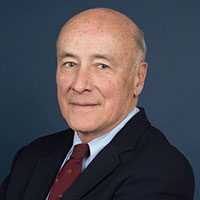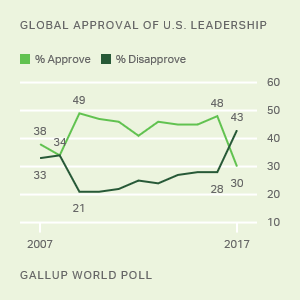
A Conversation With Joseph S. Nye
Political scientist and foreign policy scholar
Among your many accomplishments, you're known for coining the term "soft power." It's now part of the lexicon of foreign policy. How much does soft power matter today? Does it matter more or less?
Nye: Soft power is the ability to affect others to get what you want through attraction rather than coercion or payment. It supplements rather than replaces hard power, but if you are attractive, you do not have to spend as much on carrots and sticks as otherwise would be the case. Soft power has always been important, but it is increasingly so in an information age when a greater number of issues depend not just on whose army wins but on whose story wins.
How do you see approval ratings like Gallup's fitting into the conversation about soft power? Do they? Should leaders care what the world thinks of them?
Nye: Soft power creates an enabling (or disabling) environment. When Bush 43 wanted Turkish help with the invasion of Iraq in 2003, it was not forthcoming because of our low approval ratings in the Turkish Parliament. A number of foreign analysts have told me that their country is less willing to cut Trump any slack because of his offensive comments and actions.
Any surprises for you in this report? If no, why not? And if yes, can you talk a little about a few of them and why they surprised you?
Nye: There were no great surprises, but that is a good thing in terms of intuitive validation of the results. Soft power always depends on the perceptions of others, and those perceptions are framed by their situations and experiences, as your poll shows.
For example, Kosovo's high approval of the U.S. is not caused by Trump, but by our support for their coming into existence two decades ago. But Canada's precipitous drop in approval can probably be attributed to Trump's disrespectful tweets about Trudeau and the bullying attitudes the U.S. took toward the renegotiation of NAFTA.
You've given a lot of advice to leaders over the years. If you had to advise the leaders of the U.S., Germany, Russia or China on these data, what would you tell them?
Nye: You always have a "two audience problem." Slogans that sell well at home can sound ugly overseas. If you declare "America First," it sounds to others like their interests are secondary. Define and state your national interests in far-sighted ways that can include the interests of others.
You argued a few years ago that the American century is far from over. Do you feel any different today? If yes, why? And if no, why?
Nye: China is not about to surpass the U.S. if one looks carefully at such hard power measures as demography, geography, cutting-edge technology, global military power projection, the financial role of the dollar and so forth -- but our degree of dominance will be reduced in the future, and we will need cooperation with others to achieve many of our objectives.
The degree of that cooperation will be affected by our soft power. We must hope our current loss since 2017 is temporary. It is interesting to remember that the U.S. lost soft power in the Vietnam era, but recovered in subsequent decades.
Joseph S. Nye Jr. is University Distinguished Service Professor, Emeritus and the former dean of Harvard's Kennedy School of Government. He served as assistant secretary of defense for international security affairs, as chair of the National Intelligence Council and as deputy under secretary of state. In 2008, he was ranked as the most influential scholar on American foreign policy, and in 2011, Foreign Policy named him one of the top 100 global thinkers.
Learn more about how the world views the U.S. and other major global powers in Gallup's Rating World Leaders: 2019 report.
The views of those interviewed are expressly their own.



